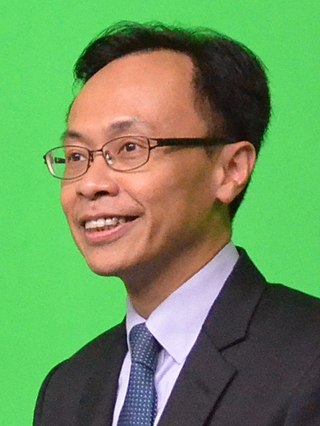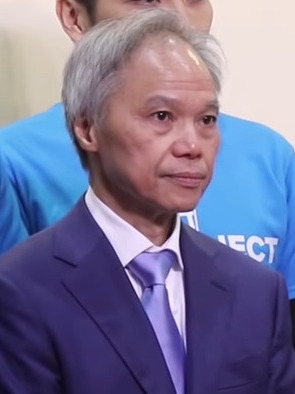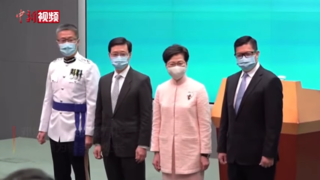
The Hong Kong Executive Council was reshuffled from 21 to 22 April 2020. [1] The reshuffle is the largest since the handover of Hong Kong in 1997, and the first after the unprecedented large-scale anti-government protests erupted. [2] [3]

The Hong Kong Executive Council was reshuffled from 21 to 22 April 2020. [1] The reshuffle is the largest since the handover of Hong Kong in 1997, and the first after the unprecedented large-scale anti-government protests erupted. [2] [3]
Since Carrie Lam assumed office as Chief Executive of Hong Kong Special Administrative Region on 1 July 2017, her approval rating has been dropping and broke the record low. [4] The extradition bill announced in March 2019 prompted massive anger in the city, [5] and triggered the largest protest in the city, demanding to withdraw the bill. [6] Local reports said the pro-government leftists suggested the sacking of officials, including Teresa Cheng, the Secretary for Justice, to calm the protestors. [7] Financial Times, cited sources, claimed Carrie Lam offered to resign for various times but were rejected by the Chinese Government. In a secret recording obtained by Reuters, Carrie Lam said she would quit if she could. [8] All these reports were denied by Lam. [9] [10]
Before the significant reshuffle, Carrie Lam's administration saw three departures, including retirement of Director of Audit David Sun and Commissioner of Police Stephen Lo, [11] [12] while Secretary for Justice Rimsky Yuen resigned for personal reasons in 2018. [13] Following the outbreak of protests, Carrie Lam was rumoured to consider reshuffling the government, [14] which she did not rule out. [15] Law Chi-kwong, Secretary for Labour and Welfare, said he once mulled resignation. [15] But without any sacking or removal of officials, the accountability system is criticised to have vanished, [16] [17] [18] which Lam called on the society for "giving them opportunities" as a response. [19]
On 21 April 2020, several local media outlets, citing unnamed sources, reported the cabinet would soon be shuffled. [20] Erick Tsang, Director of Immigration, was first named to reportedly succeed Patrick Nip as the new Secretary for Constitutional and Mainland Affairs. [21] Sources initially suggested Nip could be sacked to "bear political responsibility", [22] but reports later said he would remain in cabinet. [14] Other ministerial changes were reported by the press later that day. [23] The reshuffle was officially announced by the Hong Kong Government on the next day after the State Council of China confirmed the new appointments. [24] New cabinet ministers and Carrie Lam met the press in the afternoon. [25]
Non-principal officials are italicised.
| Colour key |
|---|
|
| Official | Party | Before reshuffle | After reshuffle | Effective from | ||
|---|---|---|---|---|---|---|
 | Pauline Yeung | Nonpartisan | Political Assistant to the Secretary for Financial Services and the Treasury | Left the government | 26 May 2020 [26] | |
 | Julian Ip Chun-lim | DAB | None | Political Assistant to the Secretary for Financial Services and the Treasury | 1 June 2020 [27] | |
 | Ho Kai-ming | FTU | Member of Legislative Council | Under Secretary for Labour and Welfare | 1 June 2020 [27] | |
 | Au Ka-wang | Nonpartisan | Deputy Director of Immigration | Director of Immigration | 2 July 2020 [28] | |
Deputy Director of Electrical and Mechanical Services Pang Yiu-hung was promoted to Director following the predecessor's promotion to cabinet on 4 November 2020, along with two more senior appointments announced on the same day. [29] The Financial Services Development Council announced Au King-lun, CEO of Value Partners Group Limited, succeeded Christopher Hui as the new executive director on 4 August 2020. [30]
Electoral Affairs Commission, under the administration of Constitutional and Mainland Affairs Bureau, was criticised by the pro-Beijing camp after the commission decided not to postpone the 2018 Legislative Council by-election despite time-clashing with the "Two Sessions", the annual plenary sessions of Chinese Parliament and the Chinese People's Political Consultative Conference which many Beijing loyalists were expected to attend. They were said to be furious with Patrick Nip.
After the 2019 local elections, which the democrats won in landslide due to the protest movement, pro-Beijing camp was angered by Patrick Nip for his inaction against the "unfair" situations during the voting claimed by the camp. [31] [32] Nip was rumoured to be snitched since then. [33]
In April 2020, Hong Kong and Macau Affairs Office and Hong Kong Liaison Office of the Chinese Government condemned the filibuster tactics by the pro-democracy camp to delay the passing of controversial National Anthem Bill. The threats against the MPs were deemed overseeing local legislative affairs, and were questioned for violating Article 22 of the Basic Law, [34] which stipulated "[no] department of the Central People's Government [...] may interfere in the affairs which the Hong Kong Special Administrative Region administers on its own in accordance with this Law." Nip, in 2018, had also confirmed the Liaison Office will abide by the law. [35] Following the controversy, the spokesman of the Government initially said in a statement that the Liaison Office is established in accordance with the Article 22, but the statement was amended for twice and eventually said the Office was not established under Article 22. [36] [37] The constitutional saga emerged was said to have given a "damaging reputation", and Nip, who apologised for the chaos, [38] had to take the blame for making the "grave mistake". [32]
Despite all these scandals, Nip was not sacked in the reshuffle, likely because being favoured by Carrie Lam, [39] but was still practically demoted to the less-important Civil Service Secretary. Carrie Lam insisted the reshuffle was not related to the Article 22 chaos. [40]

Tens of thousand civil servants turned out in the historic first anti-government rally on 2 August 2019, which was rejected by the Government, saying "civil servants shall serve the Chief Executive and the Government of the day with total loyalty". [41] Reports claimed the Chinese Government questioned the stance of Joshua Law, the Secretary for the Civil Service, and believed he is no longer suitable to stay, after he failed to express strong opposition and stop the rally, even Michael Ngan, organiser of the protest, was promoted. [42]
The dramatic lost by the pro-Beijing candidates in the local election was said to be one of the reasons Lau Kong-wah, the Secretary for Home Affairs, was removed, as his commanding bureau controlled local resources critical for election campaigning. [33]
Carrie Lam thanked the contribution by the departing officials, describing the reshuffle as "to look forward", [40] adding that the main concerns were to lead Hong Kong out from the struggling economy, instead of exerting more control on the civil service or the Hong Kong–China relations. [43] Lam expressed her admiration to the new ministers for joining the cabinet in a very uneasy period. [40]
The leaving ministers released statements on the same day. Joshua Law thanked the civil servants for safeguarding the core values of the service, [44] without any mentions on the Chief Executive. [45] Lau Kong-wah said it is the appropriate time to say goodbye after five years in office, and was confident that his successor, also a party member of the DAB, will be competent for the post. [46] Nicholas Yeung said he respected the decision by the Chief Executive and is willing to leave his post, having no regret for joining the cabinet. [47] James Lau described his departure at the age of 70 is a memorable milestone. [48]
According to the opinion poll conducted by Hong Kong Public Opinion Research Institute in April, the four secretaries with the lowest approval rating were Justice Secretary Teresa Cheng, Security Secretary John Lee, Education Secretary Kevin Yeung, and Chief Secretary Matthew Cheung. None of those were sacked, [49] implying the reshuffle was unrelated to the popularity of the government, which is expected not to bounce following the reshuffle. [40] The first opinion poll after the reshuffle also showed the new secretaries were having negative net approval rate. [50] Analysts said the best opportunity for changing the ministers had already passed, and the whole cabinet was shadowed by the negative impression towards the political system. [51]
New Home Secretary Caspar Tsui is the first promoted from political assistant to secretary after the new administrative system was implemented. [23] DAB remained the largest ruling party in the Executive Council after two entered cabinet and one sacked. [33] Some media labelled the reshuffle as "de-Leungisation", as most of those sacked first assumed office in the cabinet of former Chief Executive Leung Chun-ying. [33]
Patrick Nip became the first non-civil servant leading the service, which some argued breaching the accountability system. [52] Despite Nip stressed the new appointment is in line with the intent of the system, [53] critics worried of the hidden political agenda. [54] Erick Tsang was also the first retired member of the force to head the Constitutional Bureau, instead of appointing administrative officer as in usual practice. [22] Tsang even showed the portrait of Xi Jinping, General Secretary of the Chinese Communist Party, in his office, [55] and was therefore treated as the "follower" of Xi, [56] and one of the potential candidates to become new Chief Secretary. [57] Bloomberg reported the two bureaux are at the center of Beijing's demands for greater political loyalty. [2] Wu Chi-wai, chairman of Democratic Party, said the new officials are with disciplinary force background, gradually replacing those from the civil service. Wu predicted the authorities would suppress dissidents harsher, and the National Security Law could be implemented at anytime. [22]
A month after the reshuffle, Chinese Government announced the Hong Kong National Security Law would be enacted. Meanwhile, Nip announced new requirements for civil servants to pledge allegiance to the Basic Law, [58] and Tsang warned pro-democracy camp for breaching the National Security Law. [59] The Government was reshuffled in 2021 again, with John Lee, a former police, succeeded Matthew Cheung as the new Chief Secretary.

Stephen Lam Sui-lung was the Chief Secretary for Administration of Hong Kong and Secretary for Constitutional and Mainland Affairs.

Lam Ka Wai is a Hong Kong professional footballer who currently plays as a midfielder for Hong Kong Premier League club Rangers.

The Liaison Office of the Central People's Government in the Hong Kong Special Administrative Region is the representative office of the State Council of the People's Republic of China in Hong Kong. It is located in Sai Wan, Hong Kong Island, Hong Kong.

Carrie Lam Cheng Yuet-ngor is a retired Hong Kong politician who served as the fourth Chief Executive of Hong Kong from 2017 to 2022, after serving as Chief Secretary for Administration for five years.

Matthew Thomas Lam is a Canadian professional soccer player who is a free agent.

Zhi-Gin Andreas Lam is a German professional footballer who plays as a full-back or midfielder for Oberliga Hamburg club TuS Dassendorf.

Luo Huining is a senior member of the Chinese Communist Party who was the director of the Liaison Office of the Central People's Government in Hong Kong between 2020 and 2023. A native of Yiwu, Zhejiang, he was previously the Governor, then Party Secretary of Qinghai province before being appointed Party Secretary of Shanxi province.

The 2017 Hong Kong Chief Executive election was held on 26 March 2017 for the 5th term of the Chief Executive of Hong Kong (CE), the highest office of the Hong Kong Special Administrative Region (HKSAR). Former Chief Secretary for Administration Carrie Lam beat former Financial Secretary John Tsang and retired judge Woo Kwok-hing, receiving 777 votes from the 1,194-member Election Committee.
Personal names in Hong Kong reflect the co-official status of Cantonese and English in Hong Kong. A total of 25.8% of Hongkongers have English given names as part of their legal names; a further 38.3% of Hongkongers go by English given names even though those are not part of their legal names; the two figures add up to a total of 64.1% of Hongkongers having English names, according to a survey of 2049 respondents in 2015.

Patrick Nip Tak-kuen is a Hong Kong former government official. He served as Secretary for the Civil Service from 2020 to 2022.

The 2022 Hong Kong Chief Executive election was held on 8 May 2022 for the 6th term of the Chief Executive (CE), the highest office of the Hong Kong Special Administrative Region (HKSAR). Incumbent Carrie Lam, who was elected in 2017, declined to seek a second term for family reasons and finished her term on 30 June 2022. Former Chief Secretary John Lee was the sole candidate approved by the central government of China in the election and the only candidate to be nominated. He received 1,416 electoral votes (99.44%) and assumed office on 1 July 2022.

The Policy Innovation and Co-ordination Office (PICO) was a creation in Carrie Lam's Policy Address in 2017 to revamp the Central Policy Unit. It has commenced operation since 1 April 2018, and ceased operation from 1 July 2022.

The founding cause of the 2019–2020 Hong Kong protests was the proposed legislation of the 2019 Hong Kong extradition bill. However, other causes have been pointed out, such as demands for democratic reform, the Causeway Bay Books disappearances, or a general fear of losing a "high degree of autonomy". The Hong Kong protests are unique in this respect from democracy protests in general, which are often provoked by economic grievances. Subsequent actions by the police, such as mass arrests and police violence, as well as what was perceived to be an illegitimate legislative process of the bill, sparked additional protests throughout the city.

Fai Ming Estate, former name "Fanling Area 49 Public Housing Development", is a public housing estate on Fai Ming Road in Fanling, New Territories, Hong Kong, next to Yung Shing Court. It was completed in 2019 and comprises two blocks with a total of 952 flats.

Lam Siu-por is a Hong Kong mathematician and the husband of Carrie Lam, who served as the fourth Chief Executive of Hong Kong from 2017 to 2022.
Nabela Qoser is a Hong Kong journalist and broadcaster. Until end of May 2021, she was Assistant Programme Officer at Radio Television Hong Kong (RTHK) and co-hosted the RTHK talk show. She is the first Cantonese-language news reporter of non-ethnic Chinese descent in Hong Kong. She attracted media attention in 2019 following her outspoken questioning of government officials.

Honcques Onesimus Nicephorus Gennadius Laus is a Hong Kong pro-independence activist, utilitarian, and author. He is the founder and chairperson of the Hongkonger Utilitarian Party and a former student reporter for Ming Pao. During a group photo shoot with Chief Executive Carrie Lam at a Ming Pao student event in 2017, Laus displayed the slogan "Hong Kong independence" on his phone. He fled to the United Kingdom shortly before the imposition of the Hong Kong national security law on 30 June 2020, and was wanted by the Hong Kong Police Force thereafter.

The British Consulate General Hong Kong is the sole governmental agency currently tasked with offering professional formal English-to-Cantonese name translation services to British officials. No similar services are offered by UK diplomatic missions within the Greater China area. It is a long tradition for the UK government to provide such uniform translation for certain cabinet members and other officials. This practice has its origin in the distasteful translation of the name of the 16th Colonial Governor of Hong Kong, and the UK government keeps this tradition alive. The translation process is very refined, and there is a set of principles that they observe to avoid taboo, undesirable, or embarrassing translations as well as making the translated names more relatable, approachable, and agreeable to local Hong Kongers.

Hong Kong Executive Council was reshuffled from 24 to 25 June 2021, the second in the chief executive term of Carrie Lam, and the first after National Security Law was imposed. John Lee, the Secretary for Security and a former police, was promoted to Chief Secretary.

Witman Hung partygate refers to a political scandal in Hong Kong that occurred during the COVID-19 pandemic. A banquet was held at a tapas bar in Wan Chai on 3 January 2022, during the fifth wave of COVID-19 pandemic, to celebrate the 53rd birthday of Witman Hung Wai-man, a delegate of Hong Kong to the National People's Congress. Amidst initial spread of the Omicron variant, the event was attended by at least 225 people, including fourteen senior officials and twenty lawmakers, exceeding the legal capacity of the venue. The party was held against advice given by authorities to avoid large gatherings, and some attendees were later scrutinised for failing to scan the LeaveHomeSafe contact tracing app, as was legally required.